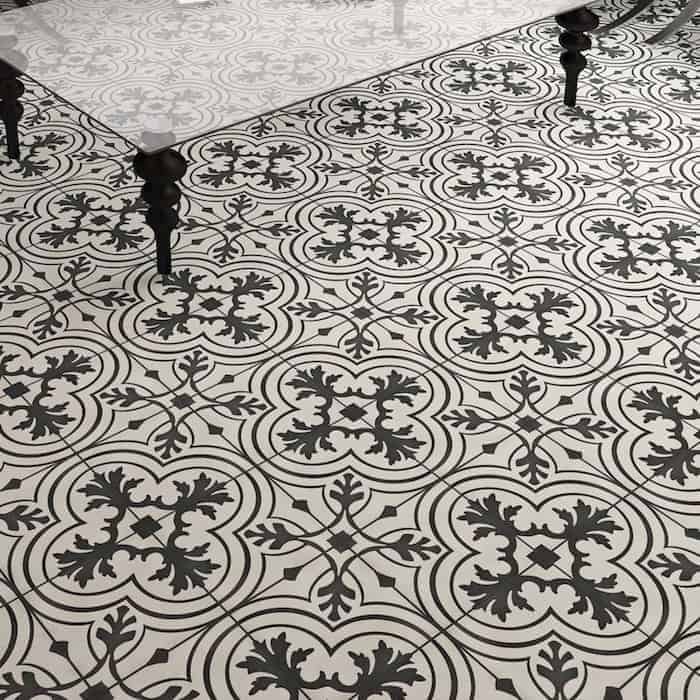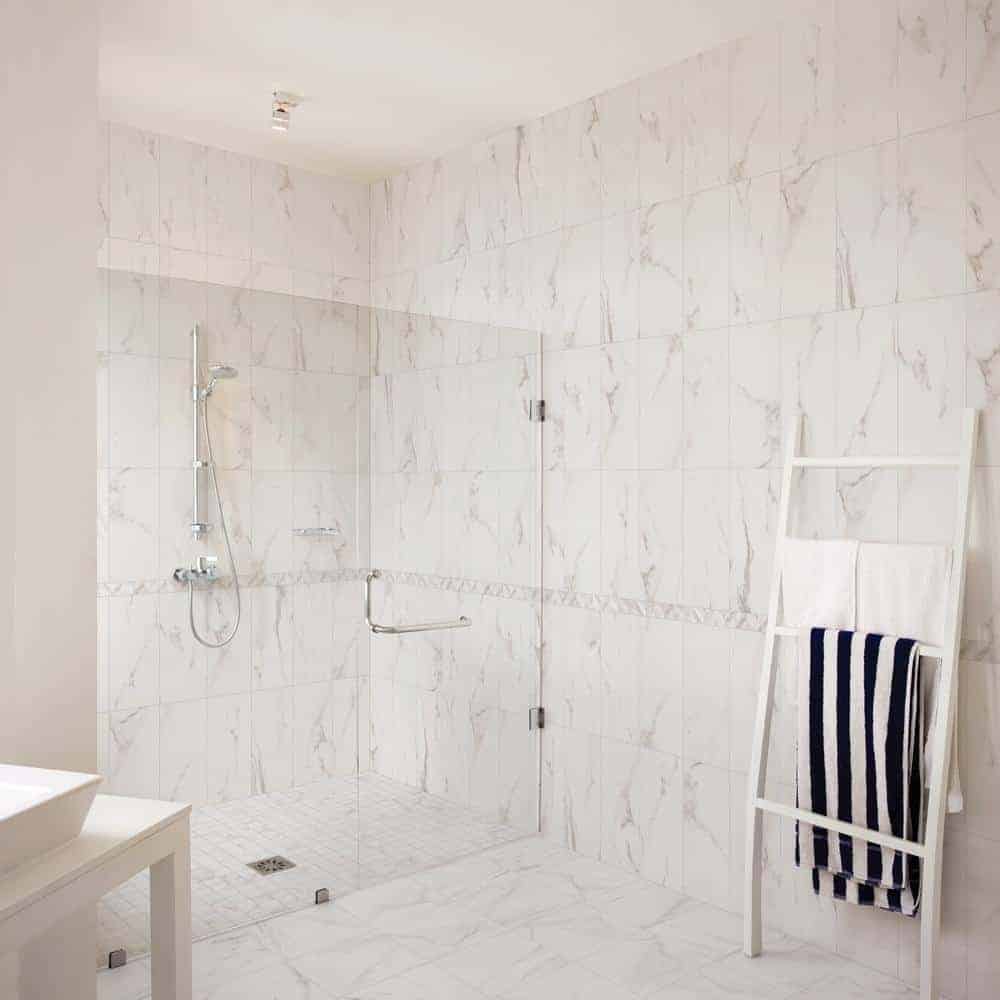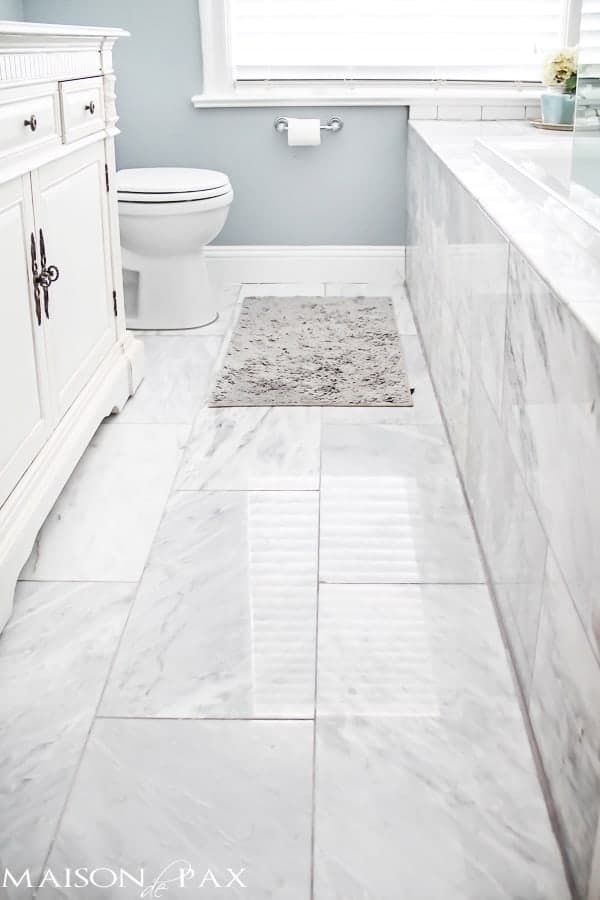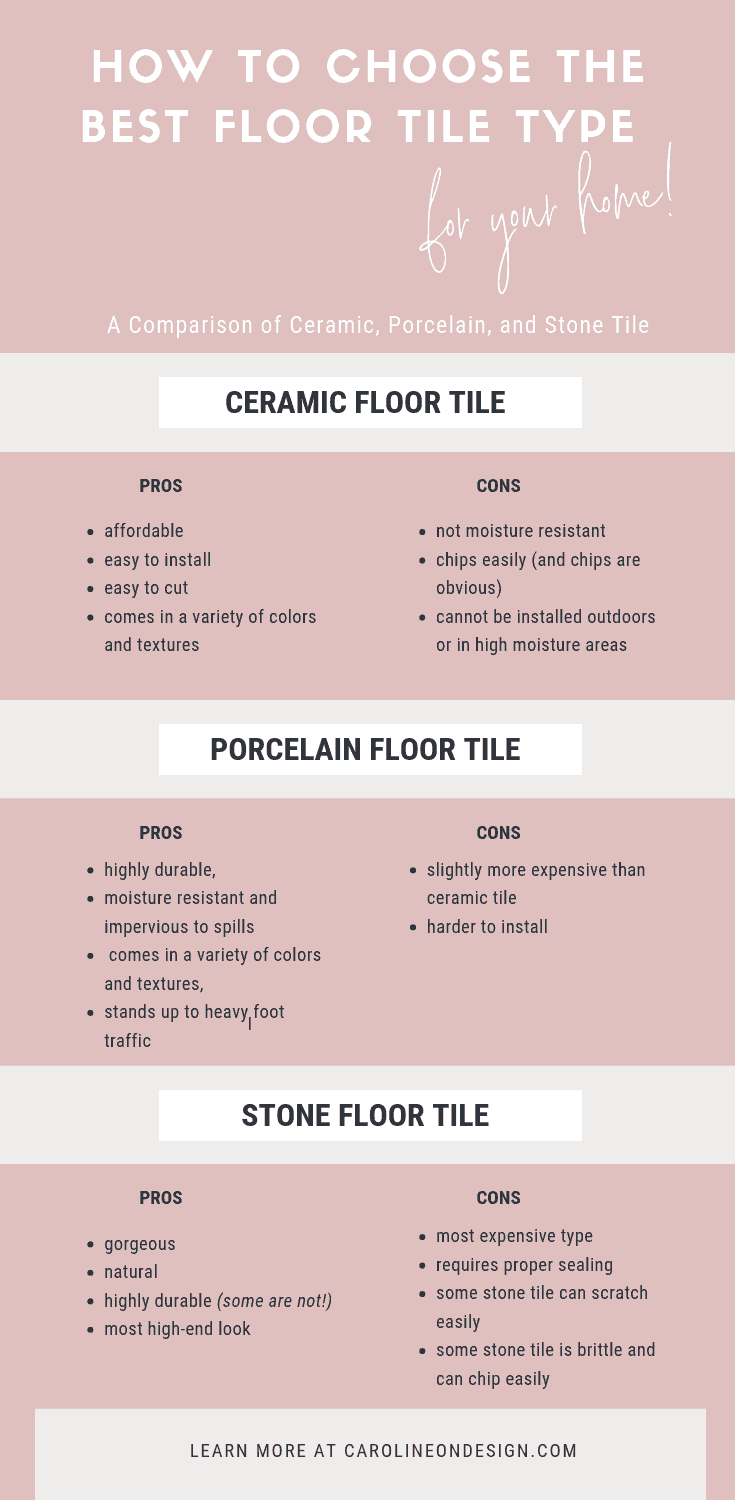Are you clueless when it comes to understanding the differences between ceramic, porcelain, and stone tile flooring?! No worries … many people answer YES to this question! So I’m sharing how to choose the best floor tile type.
In order to know what type of tile is the best choice for your home (and budget), you need to first understand the differences between these three popular types of tile.
That’s exactly what this post is all about! I’ll give an overall comparison of ceramic, porcelain, and stone tile … and by the end of this post, you’ll be ready to make the BEST choice for your own home!
Affiliate links are used for your shopping convenience. Read my full disclosure policy HERE.
HOW TO CHOOSE THE BEST FLOOR TILE TYPE
WHAT IS CERAMIC TILE?
Ceramic tile is manufactured from clays. It is the most affordable of the three options we are comparing in this post! Ceramic tile is the easiest type to install and the easiest to cut manually, but it is slightly more prone to damage than porcelain tile. Due to the way it’s constructed, if you chip ceramic tile, there is a different color underneath (so chips and scratches are obvious).
Ceramic tile must be installed on a subfloor that is smooth, flat, rigid, and clean. It should NOT be installed outdoors or any high-moisture areas in the home because it’s not moisture resistant!
Ceramic tile comes in a wide variety of colors and textures (= endless design opportunities!). These gorgeous tiles in the photo below prove that you can get fancy even with the most basic type of tile: ceramic!

CERAMIC TILE | WAYFAIR
CERAMIC TILE PROS: affordable, easy to install, easy to cut, comes in a variety of colors and textures
CERAMIC TILE CONS: not moisture resistant, chips easily (and chips are obvious), cannot be installed outdoors or in high moisture areas
WHAT IS PORCELAIN TILE?
Porcelain tile is technically a type of ceramic tile made from sands and minerals, BUT it is much hardier in the way it’s constructed!
Porcelain tile has a lot of good things going for it! It’s harder, more dense, and more durable than ceramic tile; it’s more water resistant and stain resistant than ceramic tile, AND porcelain tile is through-bodied so, when chipped, the same color is underneath the surface (so chips and scratches are disguised … unlike ceramic).
There are some drawbacks to porcelain tile. It’s harder to install than ceramic tile and requires more expertise to cut properly. Also, it is more expensive to manufacture than ceramic tile so it is a more expensive product. However, keep in mind that it can be installed in high moisture areas and outdoors.
Porcelain is the popular choice for kitchens, bathroom, and laundry rooms because of its stain and moisture resistance. It is by far the durability champ, and can stand up to heavy foot traffic, spilled water, and will last for years! Like ceramic tile, porcelain tile should be installed on a subfloor that is smooth, flat, rigid, and clean
Porcelain tile comes in a wide variety of colors and textures (= endless design opportunities!). You can even find a porcelain tile that is manufactured to mimic natural stone!

PORCELAIN TILE | HOME DEPOT
PORCELAIN TILE PROS: highly durable, moisture resistant, impervious to spills, can be used in high moisture rooms (bathroom and kitchen) and outdoors, comes in a variety of colors and textures, stands up to heavy foot traffic
PORCELAIN TILE CONS: slightly more expensive than ceramic tile, harder to install
WHAT IS NATURAL STONE TILE?
Natural stone tile includes natural materials such as slate, marble, limestone, travertine, granite, sandstone, etc. Natural stone tile is (absolutely) stunning and most stones are highly durable, BUT they do require proper sealing. Because stone tile is quite porous, it needs to be treated with a sealing agent periodically to protect its surfaces (= higher maintenance).
Some polished natural stone materials such as marble can scratch easily, and some stones are very brittle and chip easily. It’s VERY important to do your research when using natural stone tile flooring! Be sure to learn about your desired stone’s durability and sealing needs (I can’t go into detail about every choice! Some natural stones are highly durable and some are very fragile!)
Stone tile is the most expensive type of tile of the three that we covered in this post.

MARBLE FLOORING | MAISON DE PAX
STONE TILE PROS: gorgeous, natural, highly durable, most high-end look
STONE TILE CONS: most expensive type, requires proper sealing, some stone tile can scratch easily, some stone tile is brittle and can chip easily
CONCLUSION
I hope you now have a better understanding of how to choose the best floor tile type after a comparison between ceramic, porcelain, and natural stone tile!
Ceramic is the most budget-friendly, but not very durable or moisture-resistant. Porcelain is a bit pricier than ceramic BUT highly durable and resistant to water. Natural stone is by far the most high-maintenance and most expensive, but stunning!
All are GREAT choices! You just need to determine what is best for your home … and what fits into your budget!
If you’re reading this post, chances are you’re building or renovating a home … and there are SO. MANY. DESIGN. DECISIONS. Ammi right?! If you’re feeling a *tinch* overwhelmed, grab my FREE GUIDED WORKSHEET to walk you through ALL of your design decisions!


It got me when you said that porcelain tiles are durable and will resist moisture which is best for the kitchen and bathroom. I will definitely pick this for the floorings of the kitchen and bathroom of my future home. This has helped me decide now that I have saved enough money to get my dream house constructed in just a few months.
How exciting, Millie! I’m glad this post helped you out! Best of luck on building your home!
This is a really helpful blog post! We put new tile in all of our bathrooms a few years ago, and I wish I would have done more research before purchasing it. It’s a dark gray porcelain tile, but it shows more moisture than I think a lighter colored tile would. I have to get all the bathroom tile cleaned twice a year by a professional tile cleaner just to keep it looking decent. The next time I need new tile, I will have to do more research and will probably go with a more functional color!
Thank you for talking about ceramic tiles. I’ve been thinking about getting some for our kitchen. I’ll have to keep researching, but it seems like it could be a good idea. https://blackwellscarpet.com/